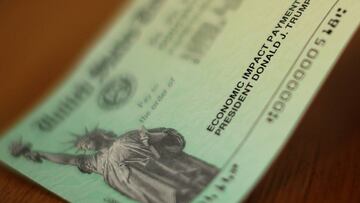Second stimulus check: which priority groups will receive the stimulus first?
Congress hopes to agree a covid-19 financial relief bill before Christmas, with a second round of Economic Impact Payments a top priority for lawmakers.


With talks ongoing over another coronavirus relief bill there is still a chance that a new deal could be agreed before Congress breaks for Christmas at the end of next week. The consensus view is that Americans need more financial support as the economic consequences of the pandemic continue, but there are a number of different options on the table.
Will the new coronavirus relief bill include another round of stimulus checks?
One of the most popular provisions included in the CARES Act was a round of Economic Impact Payment, or stimulus checks, which saw $1,200 given to all eligible Americans. In total over 160 million people received direct support from the federal government and there are hopes for something similar form the next package.
The $2.2 trillion HEROES Act passed the House of Representative back in May but it has faced tough opposition in the Republican-led Senate, where Majority Leader Mitch McConnell has refused to hold a vote on the proposal. In response, Treasury Secretary Steven Mnuchin last week tabled a new $916 billion package which would see $600 stimulus checks sent out to Americans. However the proposal included very little funding for coronavirus unemployment benefits, meaning it was dismissed by House Democrats.
🚨🚨🚨White House proposes dramatically cutting federal unemployment benefits as agreed to by bipartisan Senate group, in potentially huge blow to relief talks
— Jeff Stein (@JStein_WaPo) December 9, 2020
Mnuchin pitches $0 in federal UI benefit for jobless in exchange for one-time check of $600https://t.co/hPG3B1tuEJ
This had been the state of play until Friday when a joint proposal from Senators Bernie Sanders and Josh Hawley made a new appeal to Congress. They have threatened to prevent Senate breaking for Christmas unless another round of $1,200 stimulus checks is agreed in the next week.
Senator Sanders said in a speech on Friday: “We're not going to go home for the Christmas holidays unless we provide for the millions of families in this country who are suffering.”
With so many people facing economic desperation, Congress cannot recess until we pass a COVID-19 relief bill that includes at least $1,200 in direct payments for adults, $500 for kids, expanded unemployment benefits and emergency aid for states and cities to prevent mass layoffs.
— Bernie Sanders (@SenSanders) December 9, 2020
Who would receive the next round of stimulus checks first?
If Congress is able to reach an agreement in the remaining five days in session, or if the Sanders-Hawley proposal does indeed see them stay later, the federal government would begin another enormous logistical task.
Because of the huge scope of such a bill, it takes time for all the payments to be made. For example, although the CARES Act was signed into law on 27 March, it was not until late-July that most Americans had received their payments. In fact some did not receive the $1,200 Economic Impact Payment until November. With that in mind the payments will again be staggered, with some likely to get priority over others.
If the Senate "can approve a $740B NDAA package, then we should be providing direct relief to the American people," Rep. Pressley says about coronavirus aid.
— MSNBC (@MSNBC) December 12, 2020
"At this point, they're not even stimulus payments, they are survival checks." pic.twitter.com/iKsuqfuB1j
Assuming that the scope and the system used is similar to the first wave, eligible Americans can be split into five groups:
Direct deposit recipients: If your details are already on file with the IRS you should be the first to receive the stimulus check, because it utilises the fastest system. Payment though electronic transfer were first sent in mid-April.
Social Security beneficiaries: Americans who also receive Social Security payments were then second group to get their stimulus checks, again because they benefit from a quicker system. The federal government already has the relevant details and payments were usually received around a week later.
Paper check recipients: After the initial waves of payments were sent the IRS began to send out paper checks. This was reserved for those who were eligible for the support but whose direct deposit details were not on file.
Related stories
EIP card recipients: The IRS made the Economic Impact Payments in a number of ways with around 4 million Americans receiving an Economic Impact Payment debit card. These are prepaid Visa cards that were first distributed in mid-May. This group was late to receive their payments last time but it should be easier for the federal government to deposit the money this time.
Recipients with more complex situations: Despite attempts to keep the distribution as standardised as possible, with hundreds of millions of payments to be made there were unavoidable complications. This group may have received their payments in late-2020 after issues with registering for the service or administrative errors. Some unfortunate souls had to report the check as missing, lost or stolen and request another.

